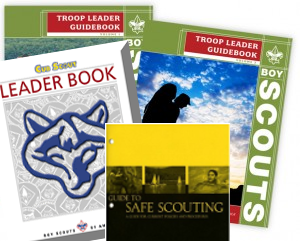 The national training team has been busy not only with revisions to training courses but also with changes to several other tools and opportunities that will help us better serve our units. Here is a summary of the latest updates on the training front: Continue reading “Training news and updates”
The national training team has been busy not only with revisions to training courses but also with changes to several other tools and opportunities that will help us better serve our units. Here is a summary of the latest updates on the training front: Continue reading “Training news and updates”
Scrub your jargon
 Have you ever listened to a talk, attended a training session or even tried to read an article or paper that contained unexplained abbreviations and terminology that you were unfamiliar with?
Have you ever listened to a talk, attended a training session or even tried to read an article or paper that contained unexplained abbreviations and terminology that you were unfamiliar with?
If so, then you know what it’s like when someone who is new to our field of endeavor tries to listen in on our conversations.
“So then, the DE said to our UC, ‘407 had a great FOS this year, and all their ASMs have their LST. That and the high percentage of TAY they’re serving will help their JTE numbers’.” Continue reading “Scrub your jargon”
Why do volunteers falter?
 Scouting is a volunteer organization. We knew that already. Except for a relatively few paid staff members at the national and local council levels, almost all of the work of Scouting is done by volunteer adults, giving of their own time and resources to make Scouting happen for the youth.
Scouting is a volunteer organization. We knew that already. Except for a relatively few paid staff members at the national and local council levels, almost all of the work of Scouting is done by volunteer adults, giving of their own time and resources to make Scouting happen for the youth.
Because of this volunteer nature, the people who actually keep the wheels turning are in a different position and place than in a typical large organization such as a corporate or governmental entity. Much of this involves generous people stepping forward to take on sometimes challenging roles; other times we invite selected individuals to join our movement and carry its aims forward. Continue reading “Why do volunteers falter?”
Know the rules!
 Every game has its rules. They can be very basic or highly complex. Any baseball fan who knows the infield fly rule can tell you just how complex the rules of the game can get.
Every game has its rules. They can be very basic or highly complex. Any baseball fan who knows the infield fly rule can tell you just how complex the rules of the game can get.
Scouting is a game. Our founder, Sir Robert Baden-Powell, even said so. It’s a game with a purpose but it’s still basically a game. And like almost all games, there are rules for the game of Scouting. Our rules can range from the very basic – “Be prepared!” and “Keep it simple, make it fun!” – to the very complex, as you might find in the Guide to Advancement.
Why do we have rules? Continue reading “Know the rules!”
Is your Scouting knowledge obsolete?
 We tend to think of Scouting as a perpetual program – something that’s always been there and always will, without much changing. The ideals, the oath and law, the principle of the boys running the troop are all things that seem to be carved in stone.
We tend to think of Scouting as a perpetual program – something that’s always been there and always will, without much changing. The ideals, the oath and law, the principle of the boys running the troop are all things that seem to be carved in stone.
So how can our Scouting knowledge become obsolete in a program with so much that remains constant?
While the principles we live by don’t change, and haven’t changed in a hundred years, the way the program implements them have changed over the years, and sometimes quite dramatically. Continue reading “Is your Scouting knowledge obsolete?”

